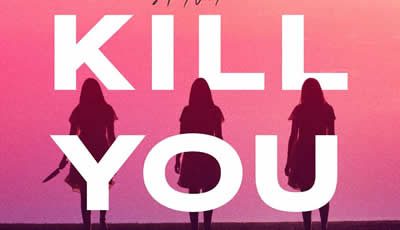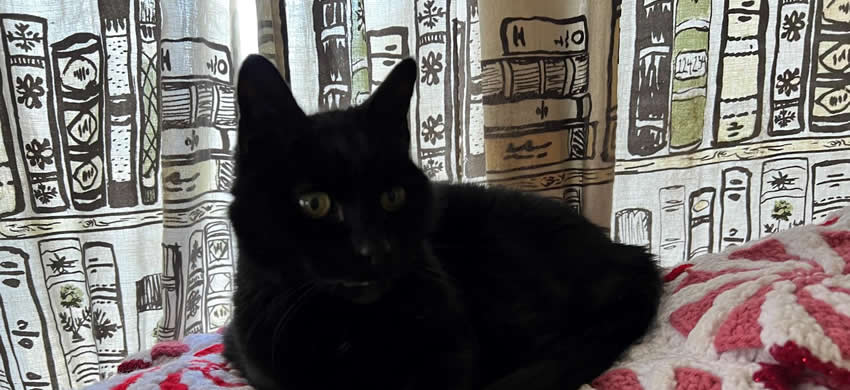

Features Up Close: Ren DeStefano
Three’s a Crowd
The identical triplet heroes and villains of Ren DeStefano’s HOW I’LL KILL YOU only have each other—and that’s fine with them. Because they have a sisterly secret to keep: they kill the men they love.
Well, Iris and Moody are the serial killers. Sissy has yet to find the man who will be her special first kill, but she hopes Mr. Right will appear soon. Instead, she meticulously cleans every crime scene her sisters create, keeping them safe and her family together.
Abandoned as infants, the state gave them names and entered them into the foster care system. But the sisters have chosen names for each other, special names that link them to each other while they are continually ripped apart by the system.
In Rainwood, Arizona, Mr. Right finally appears. Edison will be Sissy’s first murder, an act that will finally make her equal to her more accomplished sisters. When Sissy meets Edison it’s love (or something) at first sight. Sissy inserts herself into his life, but her feelings quickly become confused. Her sisters have told her she’s supposed to love him and then kill him, but the life he promises is so very tempting.
Throughout HOW I’LL KILL YOU, Sissy is shackled to her sisters Moody and Iris by obligation, guilt (her own and the legal kind of guilt), and love. We watch as Sissy battles between the naïve loyalty she feels she owes her family and her desire to become her own person. In that way, HOW I’LL KILL YOU is almost a coming-of-age novel, but with serial killers.
The Big Thrill had a chance to chat DeStefano about nature versus nurture, family obligations, and spinning common thriller tropes on their heads.
The sisters, identical triplets, are separated by the foster care system for most of their childhoods. Each child has a different rearing/nurturing experience—from abysmal to almost normal. The book has the feel of an exploration of the nature versus nurture debate. Was this intentional?
At the start, I knew I was dealing with three sisters who had been through the foster system. This helped me to understand the fierce and protective bond they had with each other, and their willingness to go through hell just so long as they could be together. But as the story took shape, I realized just how much their different upbringings did impact the roles they fell into with one another. Sissy, through random chance, was placed in a loving home. But when she saw that her sisters were having a much harder time in their placements, she felt guilt. She developed a pattern of sabotaging her happiness and hiding any healthy relationships she had from her sisters. This carries even into her adulthood. Although she has cleaned up her sister’s brutal messes, she still sees how much her sisters loved and protected each other when the world was against them. She hasn’t forgotten how much agency was taken from them, and that’s why she’ll do just about anything to protect them, and why they all see the world as a bunch of “outsiders.”
HOW I’LL KILL YOU is told from Sissy’s point of view. Why did you decide to present only Sissy’s voice instead of giving each sister a chance to tell their story?
Sissy has a reputation among the sisters as being “the emotional one.” But really, she’s the most honest. Although her sisters don’t give her enough credit, she’s the one who could see all three of them the most clearly. To Sissy, there’s nothing more telling and intimate than a crime scene. She can look at the blood smears, the state of the weapon used, and the surrounding details to tell exactly what happened. And then, once she’s done the cleanup, she can see the impact each murder has taken on her sisters. She can look at the body language and verbal cues from strangers in the grocery store and guess at what their lives are like, and paint vivid imaginings to justify it. Although she says the least, she’s the most observant of the three. She sees the world with crystal clarity. If this story had been told from the perspective of Moody or Iris, it would have been clouded over by all the things they aren’t willing to face about themselves and what they’re doing. We wouldn’t get the full picture.
The sisters have chosen names for each other and never use the names given to them by the state. Iris, Moody, and Sissy. Why did you choose to have two different names for your characters?
Because the triplets were abandoned at birth and their parents never came forward, they immediately became wards of the state. Their legal names were given to them by someone they never met, and were seemingly chosen at random without much thought given. Because they had no emotional attachment to their names, and because they felt so powerless by their tumultuous upbringing, coming up with nicknames for each other was a way of taking back some power and control. Nobody outside of their trio knows the names they use for each other, though they would each say that’s the name that reflects who they really are.
The normal trope found in thrillers is the protagonist having a secret twin. Why did you decide to use identical triplets in HOW I’LL KILL YOU?
It goes back to the saying “two’s company, three’s a crowd.” Serial killers are often flying solo, so I wanted to explore the potential conflict of having more than one person who’s in on the secret. That way, there’s always the fear that someone will crack. If I’d gone with two siblings, I worried that Sissy was so loyal that she’d go along with whatever her sibling wanted indefinitely. But by giving her two sisters, there was always the potential that two would conspire against the other. When you’re harboring such a life-shattering secret, the implications can only be messy.
Another trope you twist is the Black Widow murderess. Here we have sisters who live a false life for months in order to seduce their victims and then murder them. Why is so important for the sisters to get the men to love them before they kill them?
It goes back to the idea of control. They grew up in a heartbreaking way, and as they became adults and started to seek out relationships, they only found more heartbreak in partners who neglected or cheated on them. Some might say this is par for the course in dating, but it was a final straw for them. They’d been powerless all their lives, and they weren’t going to accept that anymore. They still wanted love and happiness and the fantasy of it, but rather than giving anyone the chance to hurt them again, they would kill them while things were still good. This is one of the core conflicts Sissy faced. Things with her mark, Edison, were really good. She found herself wanting to keep this life she was building with him, but at the same time, she’d seen her sisters go through so much heartbreak that it scared her to even consider deviating from the murder pact. After all, it wasn’t just that she cleaned up the blood—she also mended their broken hearts, and knew all too well that good things can end in tragedy.
Sparks fly when Sissy meets Edison. She’s delighted to have finally found the perfect target that will elevate her to an equal in her sisters’ eyes. But she’s quickly just as swept away by him, and he is by her. How were you able to craft a legitimate love story in the middle of a serial killer horror novel?
Of the three sisters, Sissy is the only virgin—both in killing and in love. She still has a lot of innocence and naivete. And because she’s spent her entire adult life cleaning her sister’s messes out of her undying loyalty to them, she’s never given any thought to her own happiness. So, when it happens, it bowls her over. Edison is kind and vulnerable, and she thinks it’s sweet that he tries to protect her, although secretly she knows that she’s the only real threat in town.
If this were told from Edison’s perspective, it would be a sweet love story. It’s only because we have access to Sissy’s head, and we know what’s going to happen, that it isn’t. I don’t think Sissy knew herself what was an act and what was sincere, until it was too late.
Sissy also connects with Dara, her neighbor at the apartment they are renting who is being abused by her husband Tom. Why did you decide on Dara being one of the few people outside of her sisters where Sissy would find true friendship?
Sissy’s life with her sisters is very isolating. She tells herself that all the sisters need is each other, and she keeps everyone else at arm’s length. When Dara comes around, she’s meant to be a prop—Sissy is going to need some character witnesses when her boyfriend goes missing in a few months. But Dara, much like Edison, is kind and sincere. At first, Sissy worries that Dara’s observant nature will make her a threat to their operation, but then, as their friendship blooms, she begins to worry that Dara will be in danger.
Dara represents a life Sissy can never have. She knows that she can’t have close friends. She can’t let anyone know what she really is, or what she and her sisters have done. But, as with her love life, she begins to wonder what’s an act and what’s sincere. A moment comes in the story when she realizes just how much Dara’s friendship really means to her, and it also bowls her over.
What’s next for you?
Great question. I’m excited to find out the answer for myself! I had so much fun writing HOW I’LL KILL YOU and balancing the outward, pretty love story with the inward, bloody serial killer manifesto. I’d like to write more thrillers about the “nice family next door” types who are harboring a dark secret. We’re all taught to avoid ominous alleyways and look over our shoulders at night, but I want to write stories that have readers side-eyeing the nice lady who holds the door open for them, the happy dad reading to his toddler while they wait for the bus. It’s really true that we can never know what someone is hiding.
- LAST GIRL MISSING with K.L. Murphy - July 25, 2024
- CHILD OF DUST with Yigal Zur - July 25, 2024
- THE RAVENWOOD CONSPIRACY with Michael Siverling - July 19, 2024





